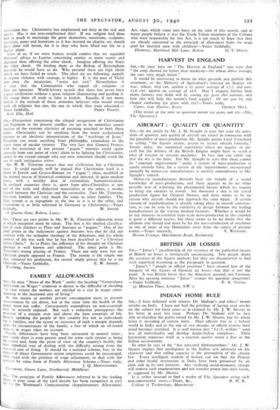Ste,—Discussions concerning the alleged antagonism of Christianity and Paganism in
the present conflict are apt to be somewhat unreal because of the extreme elasticity of meaning attached to both these terms. Christianity can be anything from the worst ecclesiastical tyranny to an idealistic interpretation of the " teachings of Jesus." Paganism can mean anything from philosophic rationalism to the worst form of secular tyranny. The very fact that General Franco, with the assistance of our present " pagan " enemies could (quite correctly from one point of view) claim to be fighting for Christianity, seems to me reason enough why our own statesmen should avoid the use of such ambiguous terms.
Mr. W. R. Titterton argues that our civilisation has a Christian basis. It could equally well be argued that Christianity itself is a blend of Jewish and Graeco-Roman (or " pagan ") ideas, modified in the normal course of historical evolution and injected, in quite modern times, with a healthy dose of rationalistic humanitarianism. In civilised countries there is, apart from ultra-Clericalists at one end of the scale and dialectical materialists at the other, a modus vivendi between the Christian and the rationalist. Pace Mr. Titterton, Christian families are very much the same as other families. The Nazi system is as repugnant to the one as it is to the other, and rationalism is as little tolerated in Germany as Christianity.—Yours


























 Previous page
Previous page